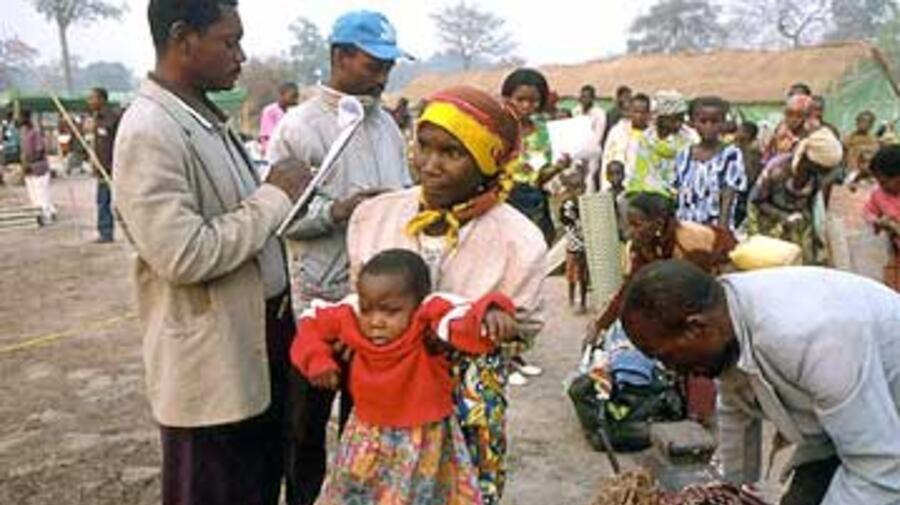Sharp drop in refugees and others of concern in 2003, says UNHCR
Sharp drop in refugees and others of concern in 2003, says UNHCR

Angolan refugees, seen here before repatriating from Divuma camp in the Democratic Republic of the Congo, were the second-largest group to return home in 2003, after the Afghans.
GENEVA, June 17 (UNHCR) - The UN refugee agency today announced that the global number of refugees and persons of concern to UNHCR dropped dramatically to 17.1 million in 2003 - the lowest in at least a decade - thanks to concerted efforts to end protracted refugee situations and find durable solutions.
According to provisional year-end statistics for 2003 released by UNHCR on Thursday, this is an 18-percent drop from 2002, when there were 20.8 million people of concern to the agency. The new figure includes 9.7 million refugees (down by 10 percent); 1.1 million returned refugees; 4.2 million internally displaced persons (IDPs); 233,000 returned IDPs; 995,000 asylum seekers; and 912,000 others, including stateless people.
High Commissioner Ruud Lubbers attributed the sharp decline to several factors, including increased international efforts to find solutions for millions of uprooted people and ongoing work by UNHCR and its partners to resolve "protracted" refugee situations that have gone on for years or even decades.
He noted that the statistics highlight the theme of this year's World Refugee Day (June 20) - "A Place to Call Home" - and offer tangible evidence of some of the successes of UNHCR and its partners in 120 countries.
"We have seen the global number of people of concern to UNHCR drop from 21.8 million when I first took office at the start of 2001, to 17.1 million at the beginning of this year - an overall decline of 22 percent," said the High Commissioner. "The statistics are very encouraging, especially for the nearly 5 million people who over the past few years have been able to either go home or to find a new place to rebuild their lives. For them, these dry statistics reflect a special reality - the end of long years in exile and the start of a new life with renewed hope for the future."
In particular, noted Lubbers, there has been an unprecedented level of voluntary repatriation over the past two years, with some 3.5 million refugees going home, mostly Afghans from Pakistan and Iran.
"The phenomenal return of Afghans to their homeland over the past few years underscores the benefits of sustained international attention and support for the work of UNHCR and its partners in regions of origin," he said.
"The impact is felt as far away as Europe, where the numbers of Afghan asylum seekers have plunged," he stressed. "But countries of return themselves also need continuing international support and investment throughout the entire process of repatriation, reintegration, rehabilitation and reconstruction. Then we know refugees can go home and stay home, ensuring the sustainability of their return."
Besides voluntary repatriation, two other durable solutions preferred by UNHCR are local integration in the country of asylum and resettlement to a third country.









